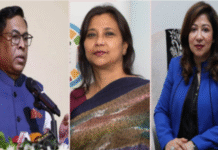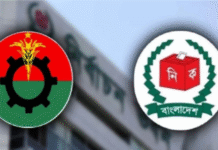Environmental degradation in the capital over the last four years has made the city less habitable for people.
Unplanned urbanisation, destruction of rivers and wetlands and absence of effective mass transport system contributed to further deterioration in the city's ambience.
According to Global Liveability Survey 2012, Dhaka is the worst liveable city among 140 in the world in terms of stability, healthcare, culture and environment, education and infrastructure.
Assuming office in 2009, the Awami League-led grand alliance government had pledged to ensure planned development of the capital and prevent environmental degradation. But very little has so far been done to honour its pledge.
In January 2010, the government embarked on a much-hyped Buriganga river clean-up drive to remove garbage including non-biodegradable polythene and sewage from the riverbed with a target of excavating nearly three lakh cubic metres of sludge.
The move soon flopped as it made no difference except for wasting public money.
Though the national taskforce on river conservation decided to stop dumping industrial, medical and other wastes into rivers, releasing refuse into the Buriganga, Balu, Turag and Shitalakkhya continued unabated.
Some laudable enforcement drives by the environment department over the last two years revealed how reckless the polluters are. They penalised 930 polluters and realised Tk 69 crore in fine.
To save water bodies from grabbers, the shipping ministry in April last year set out installing boundary pillars along the Dhaka rivers, including the Dhaleswari; but ironically, those were set up excluding the foreshores in violation of a High Court order.
The move virtually paved the way for killing the four rivers by turning those into lean streams.
Abdul Mannan Khan, state minister for housing and public works, on several occasions had vowed in public to stop the destruction of rivers, canals and wetlands by some influential real estate developers.
Addressing a seminar on June 17, 2010, the state minister said the influential realtors have reduced nearly 21 square miles of wetlands and flood plains around the capital to 2.5 square miles.
But an inter-ministerial committee led by him this year legalised half a dozen private housing schemes developed illegally on wetlands, croplands and rural homesteads on the city's eastern fringe. The High Court in June last year had declared the schemes illegal.
Liveable Dhaka has remained a distant dream as the implementation of its Detailed Area Plan (DAP) was subjected to a “final” review by a committee headed by the local government minister in the face of strong opposition from the real estate developers. The committee sat just once. The plan had been finalised by eminent technical experts in mid-2010.
Showing utter disregard for law, scores of illegal high-rises have been built by lawmakers, politicians and businessmen in Gulshan, Banani, Uttara and elsewhere in the city with the government's silent approbation.
Talking to The Daily Star, Dr Hossain Zillur Rahman, chairman of Power and Participation Research Centre, said water crisis is going to be the biggest challenge for Dhaka in the next two decades.
The capital's groundwater level has depleted by 20 metres in the last decade due to harvesting of surface water.
In the UN City Development Index (CDI), Dhaka scored 48 out of 100 and ranked below Bangalore, Colombo and Lahore in terms of quality of life, with Stockholm topping the list scoring 97.
The much talked about metro rail scheme, believed to be the only mass transport mode to salvage the city commuters from perennial traffic jam, was delayed due to repeated alteration to its route as the government compromised with vested interests.
Children in the city live an isolated and confined life in want of playgrounds, open spaces, libraries and cultural and sports activities, said eminent social activist Prof Serajul Islam Choudhury.
According to the government's own findings, there are over 100 playgrounds and parks in the capital, most of which are either in a shabby state or occupied illegally.
Lack of open space severely hinders children's social and intellectual development and they are now growing as uprooted and alienated individuals, he added.
Famed urban researcher Prof Nazrul Islam said an integrated plan for transport, environment, land and economic development is vital for Dhaka to improve liveability. An effective urban governance system should also be in place here.
Source:The Daily Star










